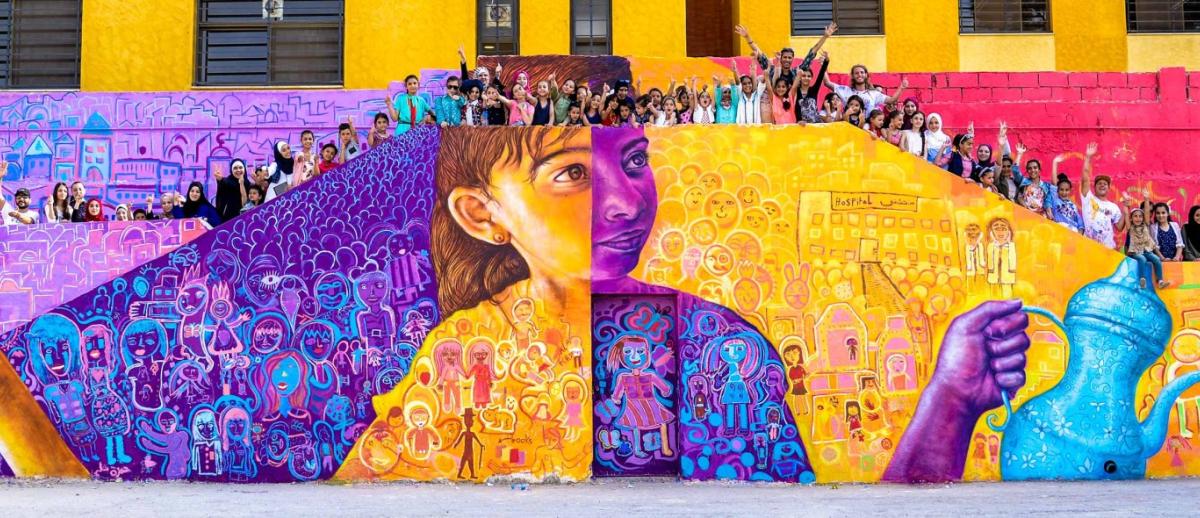Politics of Compassion in an Age of Ruthless Power
archive


Politics of Compassion in an Age of Ruthless Power
The world is confronted by many challenges that cannot be resolved within states alone. Climate change, negative globalization, economic vulnerability, social and environmental precarity, war, refugees, political corruption, and high levels of alienation from political processes and institutions are driving state dysfunction and rising levels of political extremism all around the world.
The challenges of our time are not North-South problems anymore. They are global, and they are having a profoundly pathological impact on state systems and democratic politics everywhere. In the first instance, they reflect and are producing deeply divided societies. For example, there have been few clear winners in many recent elections (e.g the United Kingdom, the United States, Germany, New Zealand, Austria were all largely divided down the middle). Second, there has been a deliberate cultivation of existential fear and anxiety by opportunistic leaders and their media allies. This has been used to justify the expansion of dominatory1 and authoritarian politics. Third, against the social democratic trends of the late 20th century a permissive environment has been created for the promotion of a politics of inequality and greed. The richest one percent of the world’s population, for example, has seen its share of global wealth increase from 44 percent in 2009 to 48 percent in 2014 and more than 50 percent in 2016.2 Fourth, the protection of this global wealth has resulted in an expanded use of coercive diplomacy and military intervention with disastrous consequences for all the countries concerned.
While these trends are eliciting some resistance, so far it has been reactive rather than pro-active and not well rooted in dynamics capable of challenging arbitrary and authoritarian rule. It is therefore vital to formulate new socio-political imaginaries that can inspire creative resistance as well as political actors motivated by serving the common good rather than sectional interests. Because Left-Right politics has lost traction since the end of the cold war, many democracies have been caught in the politics of a paralyzing present. This is why it is critical to articulate social and communitarian spaces to generate forms of public imagination that are progressive, emancipatory, and effective against ruthless power and dominatory politics.
To do this effectively requires an embrace of diversity, ambiguity, and some degree of disorder. This is a critical counterpoint to the authoritarian imagination that prioritizes political order and hierarchy in vain attempts to control a chaotic world. Authoritarian regimes are incapable of resolving complex transnational problems in an interdependent world because their intent is domination. We need a fundamental paradigm shift.
The first step in this process is to develop a rationale for ensuring that political imaginaries focus attention on how states, societies, and communities might move from dominatory to collaborative power. If we are to generate a genuine paradigm shift from a notion of sovereignty based on “power over” others to one based on “power with” others, it is critical that we embrace value and normative systems capable of sustaining egalitarian, relatively non-coercive, and integrative sensibilities. This means concentrating more attention on social rather than political sources of continuity, change, predictability, and order.
...it is critical to articulate social and communitarian spaces to generate forms of public imagination that are progressive, emancipatory, and effective against ruthless power and dominatory politics.
States like to argue that social systems are dependent on their coercive capacity, without which anarchy would reign. It is important to reverse the optics on these assumptions. Social and economic relationships are arguably more critical to effective, capable, and legitimate governance than coercive capacity. When states reveal the iron fist behind the velvet glove of enlightened governance it is normally because their policies (economic, social, or political) have failed and large numbers of citizens no longer believe that the state is acting in their interest. Most political theory and politicians with authoritarian inclinations therefore concentrate on the state as the principle ordering agent, with coercive agency as its major weapon. It is time to focus attention on more fundamental social dynamics if we are to develop paradigms capable of doing justice to diversity and to inclusive, resilient, and democratic polities.
The second step, therefore, is to focus attention on what currently delivers unity, stability, and harmony. The most fundamental social dynamic governing most relationships, and the DNA for peacefulness, is the norm of reciprocity. It has been systematically isolated and marginalized from the realm of the political by those who want to argue the primacy of the state, yet it is the norm of reciprocity that holds most communities and societies together through time. Without it states would have to depend almost completely on their monopoly of force. Predictable social relationships are much more important than “imposed” political order. Reciprocity is the glue that governs the millions of social exchanges that take place every day, most of which have nothing to do with the realm of politics. The norm of reciprocity generates altruism among kin and non-kin groups; it limits selfishness and challenges freeloaders and dominators; it creates the sociological and social psychological basis for equality, integration, and harmony, and is capable of providing a critical frame for anti-authoritarian resistive politics. To do this effectively, however, means linking this fundamental social rule to what I call the politics of compassion.
For me, therefore, new political imaginaries must be deeply rooted in basic norms of sociation and exchange accompanied by altruistic political programs aimed at serving the common good rather than narrow state interests. The politics of compassion, therefore, is the opposite of dominatory, fear driven, xenophobic politics based on a monopoly of force and coercion. I think that it has the capacity to be a new political paradigm for an interdependent world. It starts with compassionate citizens, who elect compassionate politicians capable of utilizing political mechanisms toward more compassionate societies. Its radicalism hinges on insisting that social (rather than economic and political) criteria be the major foci of political decision making (for e.g. by asking how economic, political, and military decisions will impact social well being and community). It is inclusive rather than exclusive, egalitarian rather than hierarchical, and it rests on sociation and relationships instead of domination. It aims at resolving problems nonviolently, collaboratively, empathetically, and altruistically.
The most fundamental social dynamic governing most relationships and the DNA for peacefulness is the norm of reciprocity.
For this idea to take hold, however, it is vital that leaders interested in promoting a politics of compassion build transparent and open communications and incentives to reward fair, equal, reciprocal, and resilient exchanges between peoples. In this process, more attention should be directed to enhancing the power of unifiers in communities and diminishing the power of dividers. The challenge, however, is understanding and combating all the dynamics which threaten to undermine these values—possessive individualism, neo-liberalism, and elite-driven politics.

Bansky mural in Bethlehem: Armored Dove of Peace.
Compassionate citizens do not occur by accident. They need to be nurtured and rewarded. In the first instance this suggests paying more attention to emotional intelligence. Compassionate citizens should be encouraged to lead by example rather than direction and to focus on positive rather than negative sanctions in relation to social order. The promotion of compassionate politics should reinforce positive relationships, decrease the prevalence of toxic negative emotions and behavior, increase optimism and hope, build resilience and energy levels, and counter fear-based politics. Compassionate politics is loving kindness in action. It pays particular attention to health, education, and welfare—key to life and societal happiness, and critical reinforcers of reciprocity. This is why welfare states have been so successful on most well being indicators, even though these systems are not immune to authoritarian impulses if subject to the politics of fear.
For a new, socially driven imaginary to succeed it must first, however, analyze and negate politics and practices of domination everywhere. This means analyzing relationships of domination and subordination at the personal and social as well as formal political levels. The #metoo movement is a wonderful example of women challenging patriarchal entitlement, harassment, and dominant relationships in workplaces and in homes. It is around these kinds of movements that political respect is forged and compassionate politics become possible.
Second, there can be no compassionate politics that does not place equality and inclusion at its heart. This means a radical critique of the ways in which our social processes produce and reproduce patterns of hierarchy, power, and privilege. But it also means giving priority to the weakest and poorest and, as mentioned above, an identification and reinforcement of individuals and groups who are willing to sustain the social fabric in the face of economic and political subversion.

Women’s March on Washington, January 21, 2017. Photo: Sait Serkan Gurbuz/AP
Third, it means focusing on inclusive participatory processes capable of doing justice to the concrete experiences of those who are victims of domination, violence, marginalization, and humiliation. This new paradigm rests on personal transformation and a willingness to live courageous, hopeful, and loving lives. These are critical ingredients for speaking “truth” to power, for challenging dominatory power, force, and coercion.
Finally, promoting the politics of compassion demands a few practical steps.3 People should learn the capacity to reach out to those they fear. Second, we should strive to transcend simplistic dualistic thinking so that we might touch the heart of complexity, develop more empathetic consciousness, and eliminate the unproductive naming and blaming of others for our own mistakes. A third step is imagining beyond what is seen—a quality at the heart of what this essay series has been investigating. How do we (whoever the we is) develop new imaginaries suitable for the 21st century? Finally, as John Paul Lederach suggests, we might want to risk vulnerability one step at a time. To do this means quietly replacing the old paradigms with something new, and ensuring that the risks we take will be transformative rather than ineffective. If we wish to enhance the dignity of every single human being on the planet, it is critical that we focus on emancipatory relationships—fully aware of their risks, but emboldened by the mandate for a radical alternative to a destructive, inhumane status quo.
1. Dominatory politics/processes refer to all those exchanges that result in the
persistent hierarchies based on age, race, gender or class. See Sidanius,
Jim and Pratto, Felicia (1999). Social Dominance: An Intergroup Theory of
Social Hierarchy and Oppression. Cambridge University Press.
2. Members of this global elite had an average wealth of $2.9 million per adult in 2016.
at: https://www.oxfam.org/sites/www.oxfam.org/files/file_attachments/bp210-e...
3. Derived from John Paul Lederach (2010). The moral imagination: the art and soul of



